Receive ENBOTS Meeting Reports |
||
|
Receive our ENBOTS bulletins and reports by email: |
||

| Follow @enbclimate | ||

Loading... |
||
|
Receive emailed updates with the news articles above plus related information and announcements from our CLIMATE-L community mailing list: |
||
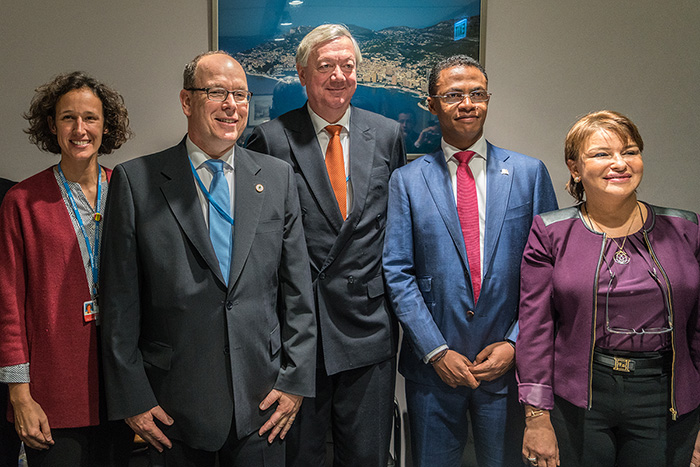 The latest signatories of the “Because the Ocean” Declaration (L-R): Valvanera Ulargui Aparicio, Director-General of the Climate Change Office, Spain; ceremony host Prince Albert II of Monaco; Hans Hoogeveen, Vice-Minister for Agriculture, the Netherlands; Ralava Beboarimisa, Minister of the Environment, Madagascar; and Hakima El Haité, Minister of the Environment, Morocco.
The latest signatories of the “Because the Ocean” Declaration (L-R): Valvanera Ulargui Aparicio, Director-General of the Climate Change Office, Spain; ceremony host Prince Albert II of Monaco; Hans Hoogeveen, Vice-Minister for Agriculture, the Netherlands; Ralava Beboarimisa, Minister of the Environment, Madagascar; and Hakima El Haité, Minister of the Environment, Morocco.
|
The following side events were covered by ENBOTS on Friday, 4 December 2015:
|
||
|
IISD Reporting Services, through its ENB on the Side (ENBOTS) Meeting Coverage, is providing web coverage, including photos and video, of an average of nine daily side events from the Paris Climate Change Conference - November-December 2015. | ||
How the UNFCCC Architecture Can Help Mobilise International Resources
to Support Carbon Capture and Storage
Presented by:
Global CCS Institute
Moderator Mark Bonner, Global CCS Institute, opened the session, outlining the ways the UNFCCC could contribute to supporting the development of CCS projects, underscoring that decisions within the UNFCCC influence domestic policies. Highlighting 22 large-scale CCS projects that are already operational or under construction, and a further 23 in the advanced stage of project development, he stated that the level of deployment would need to be scaled up to achieve the 2ºC goal.
Ulrika Raab, Swedish Energy Agency, spoke on the key points of the October 2014 Technical Examination Meeting (TEM) on carbon capture, utilization and storage (CCUS), including acknowledgement that CCUS should be an element of the “ultimate and necessary transition to net-zero emissions.” She highlighted options raised at the TEM as potential measures to unlock CCUS mitigation potential, including: regulatory instruments; economies of scale to reduce finance costs; and improved engagement with stakeholders.
Ellina Levina, International Energy Agency (IEA), presented a global energy policy perspective on the necessary framework for CCS to realize its mitigation potential. She underscored the likely need for CCS to enable negative emissions in the future, reporting that IEA’s 2ºC scenario expects fossil fuels to still make up 44% of primary energy demand in 2050. Stating that two thirds of all CCS would need to be implemented in developing countries by 2050, she described key recommendations from IEA’s 2013 roadmap on CCS, including: providing finance; incentivizing storage projects; developing safety regulations; enhancing public awareness; and requiring new fossil fuel plants to be at least CCS-ready. Regarding the role of the UNFCCC, she said a concise long-term goal would be instrumental in CCS deployment to build confidence in costly investments.
Erwin Jackson, Deputy CEO, The Climate Institute, gave an overview of the context of CCS in Australia, underscoring the importance of a good policy framework to enable CCS technologies to develop, noting that this had been difficult in Australia. He noted a belief among stakeholders that CCS costs are too high, suggesting this had been influenced by the success of renewable energy, and had led to scepticism about CCS. He discussed the lack of policy stability in Australia as another contributing factor, noting that the low demand in the energy market made it difficult for new technologies to make a place for themselves, but suggested there were positive signs that the landscape was changing.
Jeff Swartz, International Emissions Trading Associations (IETA), spoke on the role of carbon markets to encourage CCS deployment, stating firm belief that a global carbon market would help to get onto the 2ºC pathway at the least cost. He presented an Intended Nationally Determined Contributions (INDCs) map, highlighting the role of carbon markets in different INDCs. On the ability of carbon markets to successfully lead to implementation and deployment of CCS, he noted that there had been mixed results, and suggested policymakers be reminded that making money available was the only way to enable this to happen, and carbon markets can be a way of generating the necessary revenues.
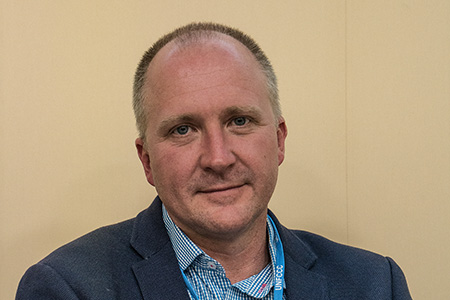 Erwin Jackson, Deputy CEO, The Climate Institute, said the INDC process had helped to refocus the “national conversation” around climate change and developing technologies.
Erwin Jackson, Deputy CEO, The Climate Institute, said the INDC process had helped to refocus the “national conversation” around climate change and developing technologies.
| 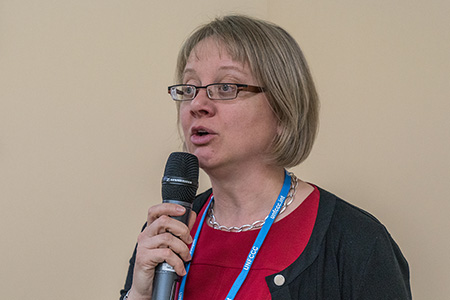 Ulrika Raab, Swedish Energy Agency, said lack of confidence in long-term policy frameworks was a barrier to CCS.
Ulrika Raab, Swedish Energy Agency, said lack of confidence in long-term policy frameworks was a barrier to CCS.
|
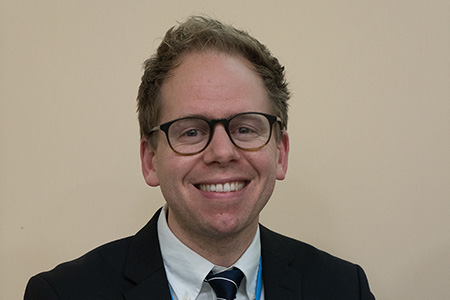 Jeff Swartz, IETA, said simple language in the text of a climate agreement on the transferability of emission reduction units between countries would help to move towards a global carbon market to reach the potential to develop CCS at scale.
Jeff Swartz, IETA, said simple language in the text of a climate agreement on the transferability of emission reduction units between countries would help to move towards a global carbon market to reach the potential to develop CCS at scale.
| 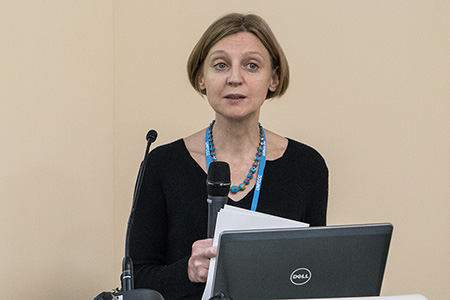 Ellina Levina, IEA, said CCS might be the only option to significantly decarbonize the industrial sector.
Ellina Levina, IEA, said CCS might be the only option to significantly decarbonize the industrial sector.
|
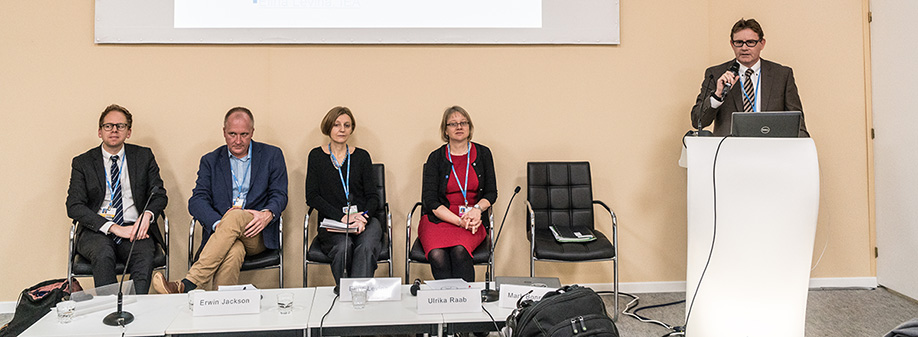 Panel (L-R):
Jeff Swartz, IETA; Erwin Jackson, Deputy CEO, The Climate Institute; Ellina Levina, IEA; Ulrika Raab, Swedish Energy Agency; Mark Bonner, Global CCS Institute
Panel (L-R):
Jeff Swartz, IETA; Erwin Jackson, Deputy CEO, The Climate Institute; Ellina Levina, IEA; Ulrika Raab, Swedish Energy Agency; Mark Bonner, Global CCS Institute
|
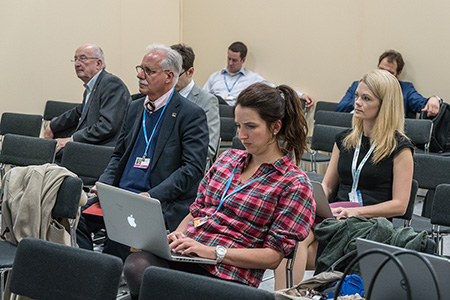
|
Climate Change Adaptation Measures With Mitigation Co-Benefits
in the Red Sea and Arabian Gulf Region
Presented by:
Gulf Cooperation Council (GCC)
This event was moderated by Ziad Abu-Ghararah, Secretary General, the Regional Organization for the Conservation of the Environment of the Red Sea and Gulf of Aden (PERSGA).
Khaled Al-Abdulkader, Saudi Aramco, spoke on mangrove conservation in the country, drawing attention to the Abu Ali region as a success story in the planting of mangroves, highlighting that due to this success, Saudi Arabia has plans to plant 2 million mangrove trees, and to designate various mangrove protected areas.
Yousef Al-Hafedh, King Abdulaziz City for Science and Technology (KACST), spoke on future prospects for limiting greenhouse gas emissions by producing high protein edible algae in Saudi Arabia. He noted multiple benefits of algae, including for food security, fertilization of agricultural areas, medicines, and biofuels; and noted ongoing research into algae as a mode of carbon capture and thus climate change mitigation.
Hareb Al-Jabri, Qatar University, shared some research findings of the Algae Technology Programme (ATP) on issues such as algae culture collection, food security, energy, health, and environmental and bioremediation benefits. He described the work of the ATP, noting the Programme has identified algal strains that can be used as protein in: cancer treatments; to remove heavy metals from water; and as a mitigation tool.
Jane Glavan, Abu Dhabi Global Environmental Data Initiative (AGEDI), spoke on a “blue carbon” project that supports subnational reporting-related targets to the Convention on Biological Diversity. She highlighted the need to protect each of the mangroves in various coastal sites around the country, and noted efforts in involving local communities in the protection of these sites. Glavan drew attention to the country’s Blue Carbon Toolkit, and shared low cost technologies to calculate above-ground carbon storage.
Ahmed Khalil, PERSGA, highlighted PERSGA’s regional strategy and programme on climate change, as well as ecosystem-based initiatives to conserve and restore key coastal habitats. He described focal areas of the programme, including: education and awareness to engage communities; action on sustainable use of resources; and strategies to protect coastal ecosystems from sea- and land-based pollution.
Maher Aziz Amer, PERSGA, presented on marine protected areas (MPAs) for building the resilience of coastal ecosystems in the Red Sea and the Gulf of Aden. He informed participants of the rich biodiversity of the marine areas in the region, and noted the benefits of MPAs, including enhancing fish stocks and providing opportunities for education and tourism. He listed action plans to address climate change in these MPAs, including on mangroves, marine turtles, coral reefs and seagrasses.
Dini Abdallah Omar, Chief Negotiator, Djibouti, highlighted the country’s current and future efforts to address coastal ecosystem resilience, highlighting the role of mangroves in coastal protection as well as in the livelihoods of local communities. Highlighting that Djibouti’s mangrove programme is financed by the Least Developed Countries Fund, he cited lessons learned in rolling out the Khor Angor mangrove project.
In the discussion participants considered, inter alia: the share of CO2 fixation done by mangroves in the context of reducing global warming; the need to include the protection of the existing mangrove areas in the INDCs of the PERSGA region; and the need for further research into algae as a mitigation measure.
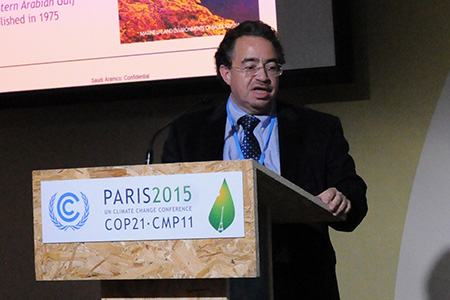 Khaled Al-Abdulkader, Saudi Aramco, noted the importance of awareness programmes on “blue carbon” in Saudi Arabia.
Khaled Al-Abdulkader, Saudi Aramco, noted the importance of awareness programmes on “blue carbon” in Saudi Arabia.
| 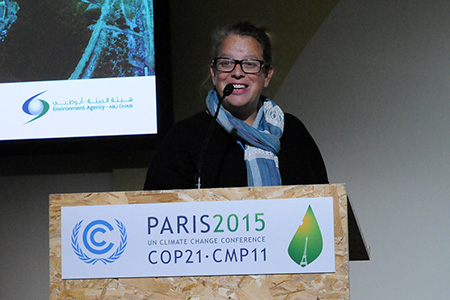 Jane Glavan, AGEDI, demonstrating the use of low cost 3-D drones to map mangroves throughout the region.
Jane Glavan, AGEDI, demonstrating the use of low cost 3-D drones to map mangroves throughout the region.
|
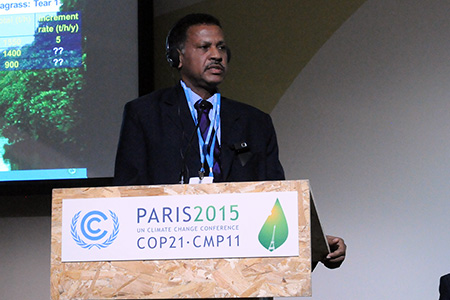 Dini Abdallah Omar, Chief Negotiator, Djibouti, noted the need for increased awareness raising on mangroves in his country.
Dini Abdallah Omar, Chief Negotiator, Djibouti, noted the need for increased awareness raising on mangroves in his country.
| 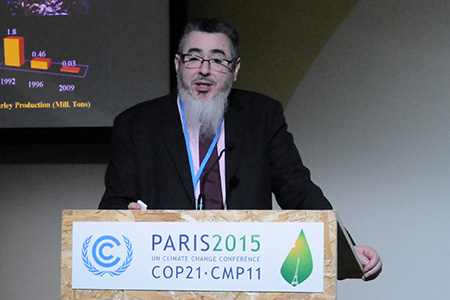 Yousef Al-Hafedh, KACST, shared progress in research on algae as a climate change mitigation tool.
Yousef Al-Hafedh, KACST, shared progress in research on algae as a climate change mitigation tool.
|
 Panel (L-R):
Khaled Al-Abdulkader, Saudi Aramco; Ahmed Khalil, PERSGA; Yousef Al-Hafedh, KACST; Jane Glavan, Abu Dhabi Global Environmental Data Initiative (AGEDI); Ziad Abu-Ghararah, Secretary General, PERSGA; Maher Aziz Amer, PERSGA; Dini Abdallah Omar, Chief Negotiator, Djibouti; and Hareb Al-Jabri, Qatar University.
Panel (L-R):
Khaled Al-Abdulkader, Saudi Aramco; Ahmed Khalil, PERSGA; Yousef Al-Hafedh, KACST; Jane Glavan, Abu Dhabi Global Environmental Data Initiative (AGEDI); Ziad Abu-Ghararah, Secretary General, PERSGA; Maher Aziz Amer, PERSGA; Dini Abdallah Omar, Chief Negotiator, Djibouti; and Hareb Al-Jabri, Qatar University.
|
Catalysing Commitments into Action: Innovation and Scalable Solutions in Cross-Sector Collaboration Presented by: CDP Worldwide (CDP), Climate-KIC, Global Green Growth Institute (GGGI) and Swiss Association for Environmentally Conscious Management (ÖBU)
This side event, moderated by Yvo de Boer, GGGI, aimed to demonstrate how Intended Nationally-Determined Contributions (INDCs) can be translated into real, meaningful and successful implementation on the ground beyond 2015. Panelists addressed cross-sector collaboration and public-private partnerships to deliver scalable solutions to the global climate challenge.
Bertrand van Ee, CEO, Climate-KIC, reminded the audience that we are already experiencing a 1°C increase, which is having impacts on the economy. He explained that Climate-KIC is Europe’s biggest climate public-private partnership organization, and underscored that their biggest challenge is to educate, engage and empower more innovators to get on board with climate action.
Renat Heuberger, CEO, South Pole Group, talked about corporate action on climate mitigation and adaptation, noting there is now a clear business case for taking action, meaning it is no longer just good citizenship but rather an opportunity to invest for present and future profits.
Changmo Sung, President, Green Technology Centre Korea, (GTCK), talked about GTCK’s work developing green technologies and strategies for developing countries, outlining projects in the Philippines, the Dominican Republic and Mongolia on issues such as urban transitioning, waste-to-energy systems and green buildings.
Barbara Buchner, Climate Policy Initiative (CPI) provided an update on the Global Innovation Lab for Climate Finance, which aims to catalyse climate finance in emerging economies. She explained their methodology for crowd-sourcing ideas from NGOs, private sector and research institutions, before selecting finalists to develop and scale up projects.
Santanu Roy, GAIL India Ltd, presented a natural gas perspective, noting India’s aim to increase renewables by a factor of ten between 2015 and 2030. He highlighted efforts to increase energy efficiency in gas power stations, as well as deliver co-benefits for human development, such as providing local communities with their own gas pipes to reduce leakages from unsolicited pipe tapping.
The following discussion focused on whether the set-up of UNFCCC Conference of the Parties (COP) is helping improve dialogue between state and non-state actors; how to nurture talent and leadership for climate innovation; and the need for action on scalable ocean solutions. On the top two challenges faced, panelists mentioned shortsightedness, and convincing the private sector that climate action can be profitable. Heuberger said that the sheer existence of a Paris agreement where all the world’s countries take climate change seriously “will have a major impact on the private sector.”
Paul Simpson, Carbon Disclosure Project (CDP), closed the session by underscoring that “never before have we seen such momentum in the private sector to address climate change,” with more and more global corporations disclosing their climate actions and pledging mitigation commitments that “are actually in line with the science.”
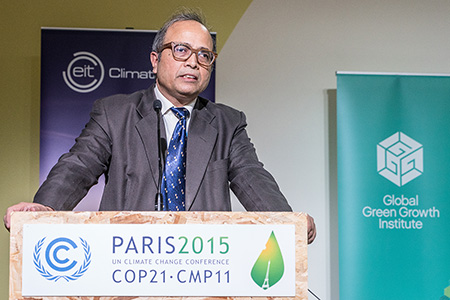 Santanu Roy, GAIL India Ltd, noted India’s aim to increase renewables by a factor of ten between 2015 and 2030.
Santanu Roy, GAIL India Ltd, noted India’s aim to increase renewables by a factor of ten between 2015 and 2030.
| 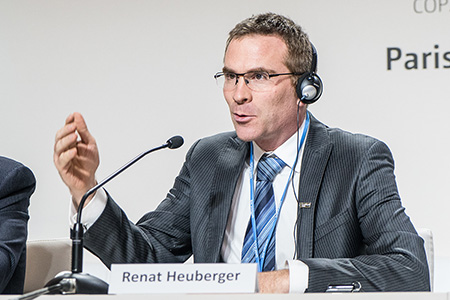 Renat Heuberger, CEO, South Pole Group, emphasized that “as policy makers are talking about sharing the climate burden, business are talking about sharing the opportunity.”
Renat Heuberger, CEO, South Pole Group, emphasized that “as policy makers are talking about sharing the climate burden, business are talking about sharing the opportunity.”
|
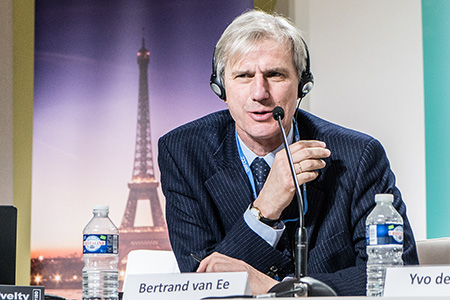 Bertrand van Ee, CEO, Climate-KIC, introduced the session by reminding the audience that: 2°C is the guard rail for ‘manageable’ climate change; we are already at 1°C change, which is having impacts on the economy; and current pledges amount to a 2.7°C change.
Bertrand van Ee, CEO, Climate-KIC, introduced the session by reminding the audience that: 2°C is the guard rail for ‘manageable’ climate change; we are already at 1°C change, which is having impacts on the economy; and current pledges amount to a 2.7°C change.
| 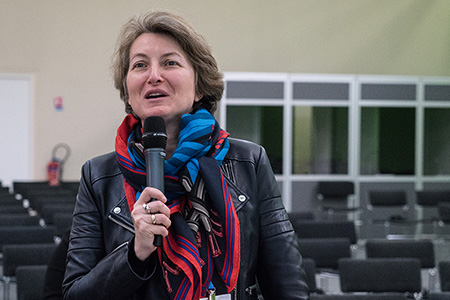 During the discussion, a participant from the World Ocean Council emphasized the need for action on scalable ocean solutions.
During the discussion, a participant from the World Ocean Council emphasized the need for action on scalable ocean solutions.
|
 Panel (L-R):
Bertrand van Ee, Climate-KIC, with an assistant on the left; Yvo de Boer, GGGI; Renat Heuberger, South Pole Group; Changmo Sung, GTCK; Barbara Buchner, CPI; Santanu Roy, GAIL India Ltd; and Paul Simpson, CDP.
Panel (L-R):
Bertrand van Ee, Climate-KIC, with an assistant on the left; Yvo de Boer, GGGI; Renat Heuberger, South Pole Group; Changmo Sung, GTCK; Barbara Buchner, CPI; Santanu Roy, GAIL India Ltd; and Paul Simpson, CDP.
|
Contacts:
- Shirin Reuvers (Coordinator) | shirin.reuvers@cdp.net
- Yoon Suk Choi (Coordinator) | yoon.choi@gggi.org
More Information:
People in the Arctic and Climate Change Presented by: Nordic Centre for Spatial Development (Nordregio) and Nordic Council of Ministers
Anna Karlsdóttir, Nordregio, presented on the human dimension of climate change in the Arctic, pointing out that the Nordic environment is already subjected to dramatic climate changes. She emphasized lack of clarity on what the Arctic needs: “iconic conservation,” international investment in economic development, or to be treated as a “global common good.” Calling for holistic governance of the Arctic, she cautioned against “stereotypical” narratives that would not be accepted by the Arctic people. She explained that Nordregio is involved in sustainable development to tackle the region’s challenges and opportunities from a bottom-up perspective. Amongst shared challenges, she mentioned: peripherality; limited economic diversification; a harsh climate; and long distances. Amongst opportunities, she mentioned existing skills and abundant natural resources. Karlsdóttir presented findings from the Norden Megatrends report, highlighting trends of increased urbanization, aging, and exploitation of natural resources. She underscored the need to generate better human capital in the Arctic, by investing in people through means such as education. From the Norden Arctic Human Development Report, she highlighted emerging challenges in living conditions, including indigenous livelihoods. She pointed out that the Arctic people are detached from “highly abstract theoretical prospects” on climate change, and are more concerned about energy resources. She concluded calling for a holistic approach to sustainable development and climate change in the Arctic.
Svante Bodin, International Cryosphere Climate Initiative (ICCI), explained that warming in the Arctic has been much greater than in other areas of the world. He pointed to decreases in the levels of permafrost in the Arctic, and to their implications for vegetation, herding, infrastructure, as well as regional emissions. He informed participants that Arctic sea ice might disappear well before the end of the century, with severe impacts on people’s lives and livelihoods, as well as marine ecosystems and coastal erosion. Bodin then explained that wood burning produces black carbon, which is the third largest warming agent globally. These emissions in the Arctic affect the albedo effect, speeding ice-melting. He then pointed to the near-term climate and health benefits of reducing black carbon emissions. He added that Nordic countries are an important source of black carbon emissions from wood burning, suggesting these emissions could be reduced by “burning right.”
Discussion focused on: migration in the Arctic, including the need for improved data on cross-border statistics; and black-carbon emissions.
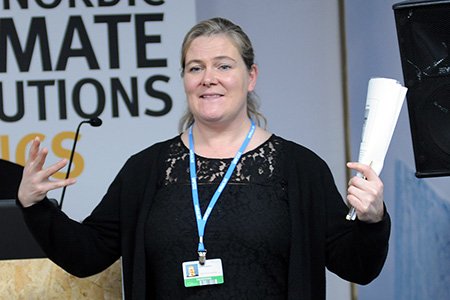 Anna Karlsdottir, Nordregio, called for a holistic approach to sustainable development and climate issues in the Arctic.
Anna Karlsdottir, Nordregio, called for a holistic approach to sustainable development and climate issues in the Arctic.
| 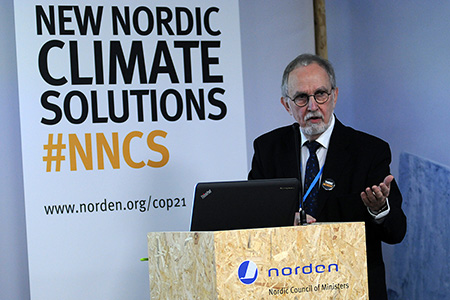 Svante Bodin, ICCI, highlighted that Nordic countries are an important source of black carbon from wood burning.
Svante Bodin, ICCI, highlighted that Nordic countries are an important source of black carbon from wood burning.
|

|
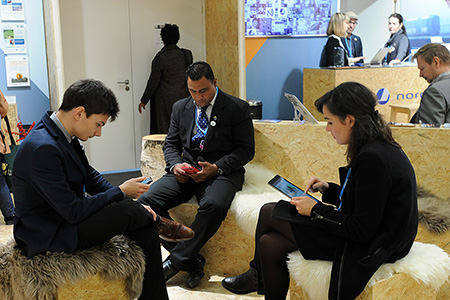
| 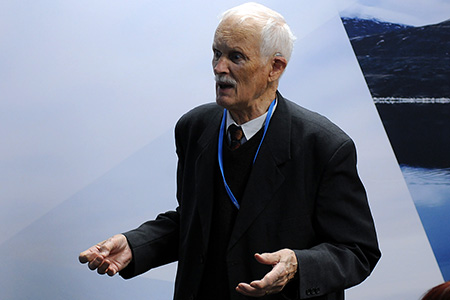
|
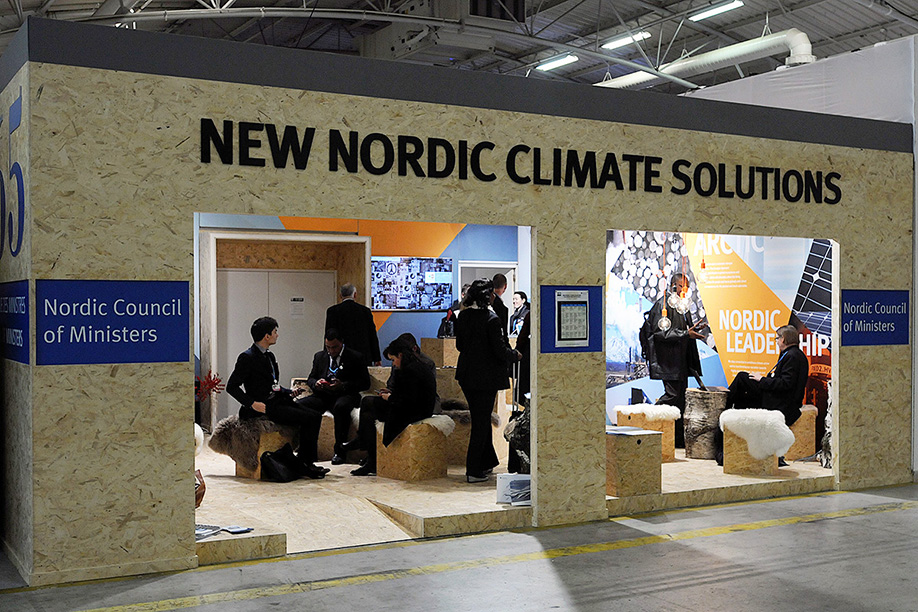
|
Technology as an Answer to Climate Change Challenges Presented by: Gulf Cooperation Council (GCC)
This discussion, moderated by Tidjani Niass, Saudi Aramco, addressed the role of technology in providing answers to climate challenges.
Gautam Kalghatgi, Saudi Aramco, presented on climate mitigation opportunities in the transport sector, noting the sector accounts for approximately 14% of global greenhouse gas emissions. He said mitigation efforts are focusing on: increasing engine efficiency; technologies reducing vehicle weight and friction; transport management and logistics; and electrification of the transport sector. He outlined Saudi Aramco’s research into new, highly efficient fuel and engine systems such as Gasoline Compression Ignition.
Nasser Al Shareef, Kuwait, presented on environmentally-friendly fuel additives and their potential for reducing major inefficiencies such as corrosion, blockage, hard deposits, lower engine efficiency and unnecessary polluting emissions. He presented the Dual Fuel Oil Additives Technology (DFOAT), which uses magnesium and water to enable more efficient and cleaner combustion in engine chambers.
Abdulaziz Al-Jodai, SABIC, presented on SABIC’s efforts in carbon capture and purification. He highlighted the development of the world’s largest CO2 purification plant in Saudi Arabia, where they are working to capture and purify CO2 that is then distributed to plants producing urea, liquified CO2, methanol and polycarbonate. He explained the value of such industrial processes as they feed into the production of, inter alia, fertilizers, processed food and drinks, polymers, chemicals and algae harvesting.
David Keys, King Abdullah University of Science & Technology (KAUST), presented on research in petascale computing, using detailed climate experiments to predict the consequences of various forms of climate change response measures. He presented KAUST’s Shaheen Cray XC40 computer system, the seventh fastest supercomputer in the world, noting its capabilities to accommodate physical effects into models with high fidelity, to solve inverse problems through the injection of data into the models, and to combine multiple complex models.
Mohammed Al Shamsi, UAE Water Aid Foundation, spoke on the Foundation’s aim to provide sustainable water aid solutions for those in need. He outlined work under the ‘combatting poverty and illness’ pillar of the Mohammed bin Rashid Al Maktoum Global Initiatives, and underscored the goal of supporting over 130 million people by 2025, with investments of AED 500 million toward water shortage challenges. He presented information on a US$1 million prize for innovative research solutions to water problems, calling for applications from innovative companies, researchers and young people.
The discussion focused on, inter alia: the role of national regulations for engine standards; the nature of the worldwide transport market; a “post-fossil-fuel strategy for Saudi Arabia”; levels of accuracy of modeling predictions; collaboration between research institutions carrying out real-time data analysis and feedback into policymaking; and carbon capture and utilization funding.
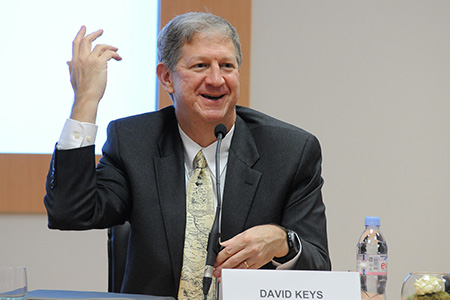 David Keys, KAUST, said computing technology could help locate the best sites for wind turbines and solar photovoltaic farms.
David Keys, KAUST, said computing technology could help locate the best sites for wind turbines and solar photovoltaic farms.
| 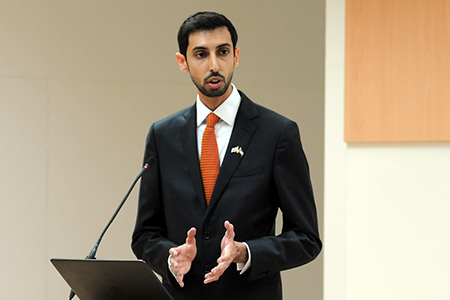 Mohammed Al Shamsi, UAE Water Aid Foundation, spoke on the Carbon Ambassador project that mentored youth graduates to develop ideas to help communities suffering from water shortages.
Mohammed Al Shamsi, UAE Water Aid Foundation, spoke on the Carbon Ambassador project that mentored youth graduates to develop ideas to help communities suffering from water shortages.
|
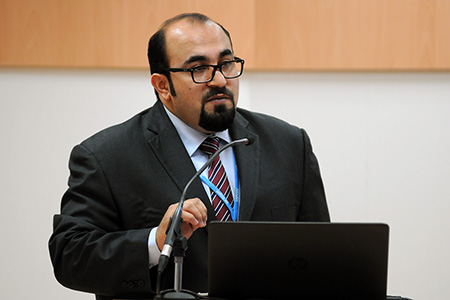 Nasser Al Shareef, Kuwait, said fuel additive technology can save power stations millions of US$ per year.
Nasser Al Shareef, Kuwait, said fuel additive technology can save power stations millions of US$ per year.
| 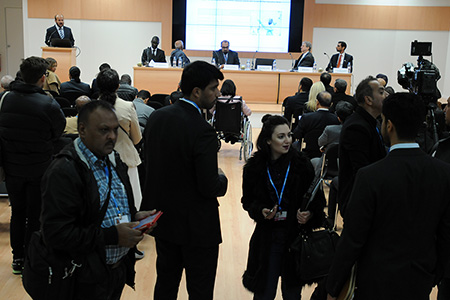 |
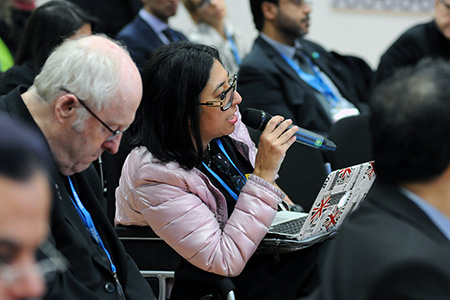 | 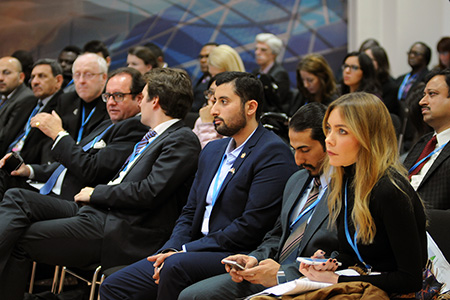 |
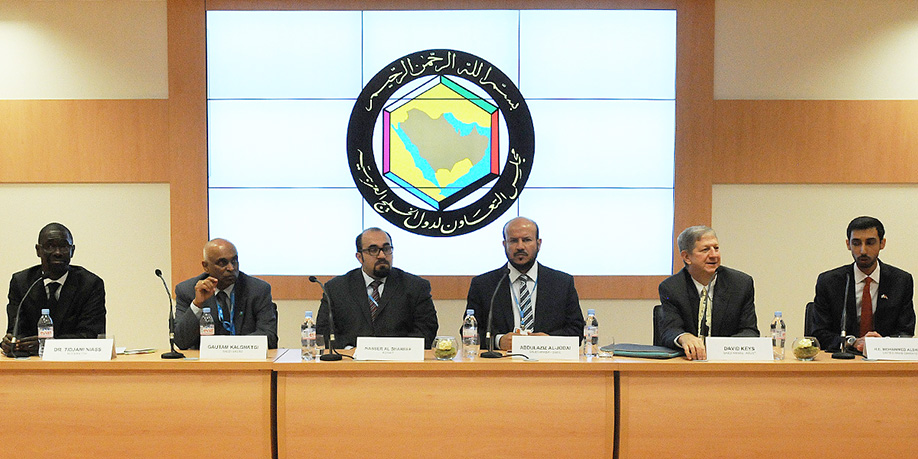 Panel (L-R):
Tidjani Niass, Aramco; Gautam Kalghatgi, Saudi Arabia; Nasser Al Shareef, Kuwait; Abdulaziz Al-Jodai, SABIC; David Keys, KAUST; Mohammed Al Shamsi, UAE Water Aid Foundation
Panel (L-R):
Tidjani Niass, Aramco; Gautam Kalghatgi, Saudi Arabia; Nasser Al Shareef, Kuwait; Abdulaziz Al-Jodai, SABIC; David Keys, KAUST; Mohammed Al Shamsi, UAE Water Aid Foundation
|
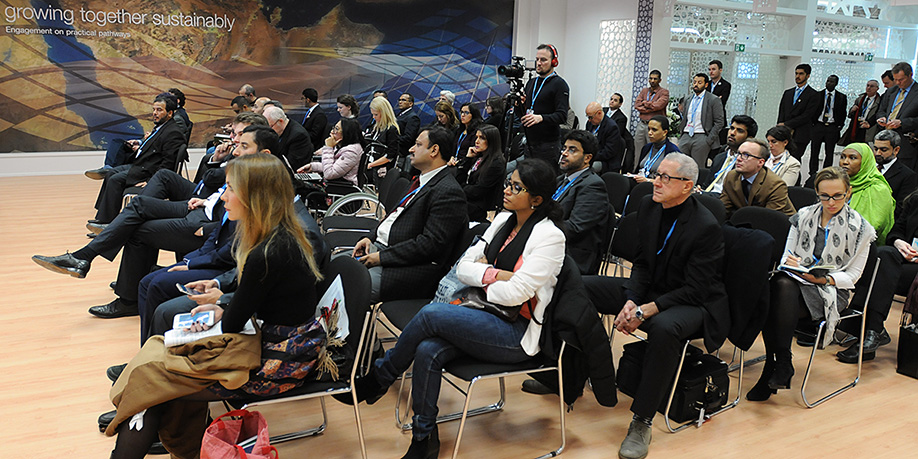
|
The Phase Out of Fossil Fuel Subsidies and the Paris Climate Deal Presented by: Climate Action Network Europe (CAN Europe) and Oil Change International (OCI)
This side event, moderated by Stephen Kretzmann, Executive Director and Founder, OCI, highlighted how phasing out fossil fuel subsidies (FFS) can contribute to: achieving the objectives of the Paris agreement; urgently reducing pre-2020 emissions; and moving finance away from fossil fuels towards clean solutions.
Wendel Trio, Director, CAN Europe, opened the session noting CAN’s work to provide the necessary framework to replace fossil fuels with renewable energy. He stressed that FFS constitute disincentives for the transition and urged for a phase-out of fossil fuels in Europe as soon as possible.
Summarizing the critical questions, Kretzmann listed: reasons to focus on production subsidies, especially in developed countries; the extent of FFS and how they work in practice; and ways to change the rules of the game.
Peter Erickson, Stockholm Environment Institute (SEI), said consideration of fossil fuels will: address carbon leakage; provide more mitigation options by avoiding fossil fuel over-production; and limit carbon lock-in. He stressed, among other things, that: of all fossil fuels, new oil production infrastructure creates the greatest lock-in risk; the impact of producer subsidies on production and emissions is less well understood than consumer subsidies; political context is key; and understanding CO2 impact requires deeper understanding of project economics.
Shelagh Whitley, Overseas Development Institute (ODI), focused on production-side FFS for G20 countries. She noted that national subsidies, public finance and investment by state-owned enterprises account for US$452 billion per year. Addressing reform, she noted lack of information and the need for coordination between those providing the subsidies and those focusing on complementary measures, and concluded that even if those prerequisites are satisfied, vested interests may well influence the processes.
Anthony Hobley, CEO, Carbon Tracker Initiative, presented on thermal coal production and its climate impact. Reiterating that financial markets can be structurally flawed, he addressed fossil fuel risk premium and the cost of capital for fossil fuels. He used case studies from the US Powder River Basin and the Australian seaborne coal subsidies to portray the impact of subsidy removal on coal demand, suggesting that this would lead to a 39% decrease in the US.
Maeve McLynn, CAN Europe, focused on how shifting subsidies can change the game. She pointed to contradictions around financing, noting that G20 countries spend $77 billion each year on national FFS while developing countries only receive $4-5 billion to adapt to climate change. She urged national governments to start implementing more comprehensive fossil fuel phase-out plans, and to redirect funds towards renewable energy and energy efficiency.
Hannele Pokka, Ministry of the Environment, Finland, urged creating a level playing field for renewable energy and bioeconomy by reforming FFS and putting a price on carbon emissions.
Dimitrios Zevgolis, European Commission, noted that subsidies, both on the supply and the demand side, need more transparency, and, focusing on export credits, he highlighted that trade negotiators often speak a different language to their environmental counterparts.
In the ensuing discussion, participants addressed, inter alia: figures on FFS for the EU; a potential legal cap on fossil fuel extraction as a way to level the playingfield; lessons from the past; and the scope for addressing subsidies and investment flows separately.
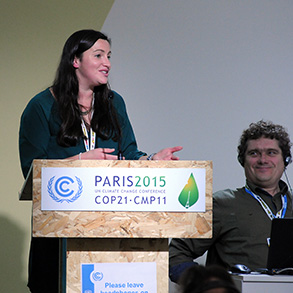 Maeve McLynn, CAN Europe noted the cost of climate change will not only be financial, but will also include the loss of livelihoods and human life.
Maeve McLynn, CAN Europe noted the cost of climate change will not only be financial, but will also include the loss of livelihoods and human life.
| 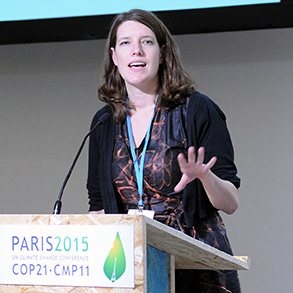 Shelagh Whitley, ODI, presented figures on total fossil fuel subsidies in G20 countries.
Shelagh Whitley, ODI, presented figures on total fossil fuel subsidies in G20 countries.
| 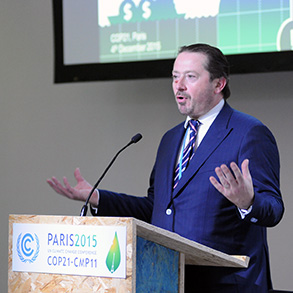 Anthony Hobley, CEO, Carbon Tracker Initiative, noted "there are as many fossil fuel subsidies as hot dinners around the world."
Anthony Hobley, CEO, Carbon Tracker Initiative, noted "there are as many fossil fuel subsidies as hot dinners around the world."
|
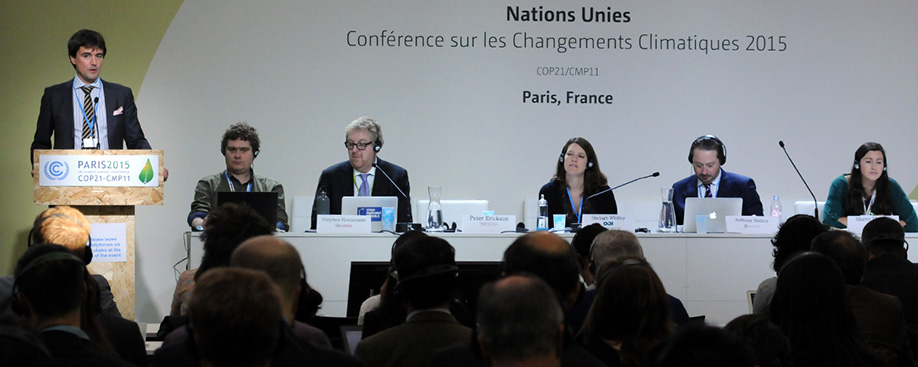 Panel (L-R):
Peter Erickson, SEI; Stephen Kretzmann, Executive Director and Founder, OCI (third from the left with the side event assistant on his right); Shelagh Whitley, ODI; Anthony Hobley, CEO, Carbon Tracker Initiative; and Maeve McLynn, CAN Europe.
Panel (L-R):
Peter Erickson, SEI; Stephen Kretzmann, Executive Director and Founder, OCI (third from the left with the side event assistant on his right); Shelagh Whitley, ODI; Anthony Hobley, CEO, Carbon Tracker Initiative; and Maeve McLynn, CAN Europe.
|

|
Contacts:
- Eddy De Neef, CAN Europe (Coordinator) | eddy@caneurope.org
- George Doukas, OCI (Coordinator) | alex@priceofoil.org
More Information:
Cleaning the Air, Saving Lives and Slowing Near-Term Climate Change Presented by: The Climate and Clean Air Coalition to Reduce Short-lived Air Pollutants (CCAC), the Norwegian Ministry of Foreign Affairs and the World Health Organization (WHO)
This side event, moderated by Diarmid Campbell-Lendrum, WHO, presented evidence and solutions for reducing health and climate risks from Short-Lived Climate Pollutants (SLCPs), focusing mainly on transport, household energy and urban health. Campbell-Lendrum noted that despite the slow pace of negotiations, progress is being made outside of the UNFCCC. He highlighted the urgency of addressing SLCPs, pointing out that seven million premature deaths every year are caused by exposure to outdoor and household air pollution.
Veerabhadran Ramanathan, CCAC Scientific Assessment Panel, underscored the need for a two-level approach for “bending the global warming curve,” which involves CO2 and SLCPs. He provided data on methane, black carbon, ozone and hydrochlorofluorocarbons (HFCs), and presented the results of a multidisciplinary study on 10 scalable solutions for carbon neutrality and climate stability.
Carlos Dora, WHO, focused on the role of cities in promoting clean air and public health. He highlighted, inter alia: clean household fuels and technologies; sustainable urban transport; diets containing less meat; housing density; and new air quality guidelines.
Focusing on clean fuels and vehicles and their benefits regarding air pollution and slowing near-term climate change, Drew Kodjak, International Council on Clean Transportation, noted that fuels and vehicles act as a single system. He highlighted that: diesel vehicles produce significant air pollution with adverse consequences to the climate and human health; fuel and engine technologies to achieve major reductions in air pollution are widely available; and cities should consider adopting world class emission standards for vehicles and fuels.
Radha Muthiah, Global Alliance for Clean Cookstoves, stressed that the way people cook is significant, noting that household air pollution accounts for 12% of ambient air pollution around the world. She underscored that clean cooking interventions empower individuals to support their development while protecting the environment, creating a win-win situation.
Bahijjahtu Abubakar, Federal Ministry of Environment, Nigeria, focused on effects of SLCPs on women and children. She noted that SCLPs have brought the element of visible change to the climate discussion, evident when SLCP action is taken. She focused on women and children, drawing parallels between physical health, nurturing families and education.
Hanne Bjurstrøm, Ministry of Climate and Environment, Norway, underscored the Urban Health, and the Household Cooking and Domestic Heating Initiatives, noting the need to inform people around the world about the importance of SLCPs.
During discussions, participants addressed, inter alia: the mitigation potential of black carbon; modelling versus observation techniques; the impacts of particulate matter and black carbon on health; catalytic convertors and gasoline vehicles; and ways to engage the medical community.
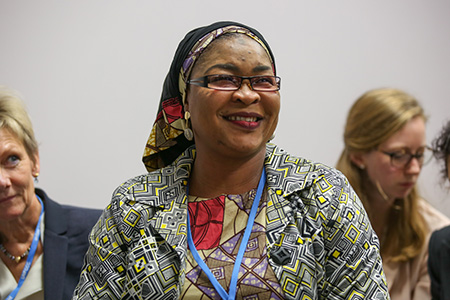 Bahijjahtu Abubakar, Federal Ministry of Environment, Nigeria, stressed the importance of bringing health into the climate discussion, stating “you know you have to be alive first, before attending the next COP.”
Bahijjahtu Abubakar, Federal Ministry of Environment, Nigeria, stressed the importance of bringing health into the climate discussion, stating “you know you have to be alive first, before attending the next COP.”
| 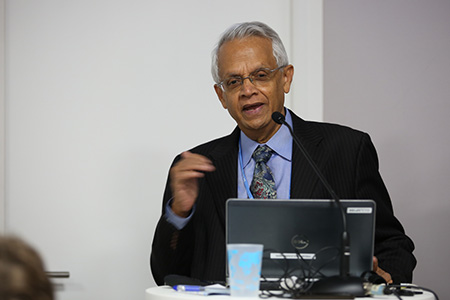 Veerabhadran Ramanathan, CCAC Scientific Assessment Panel, noted that black carbon is the second most important contributor to global warming.
Veerabhadran Ramanathan, CCAC Scientific Assessment Panel, noted that black carbon is the second most important contributor to global warming.
|
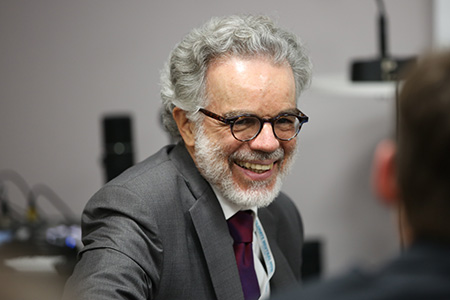 Carlos Dora, WHO, noted that air pollution is increasing in cities in emerging economies and decreasing in developed countries.
Carlos Dora, WHO, noted that air pollution is increasing in cities in emerging economies and decreasing in developed countries.
| 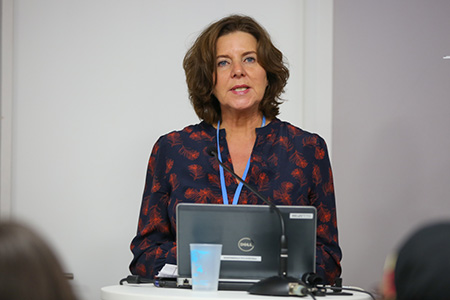 Hanne Bjurstrøm, Ministry of Climate and Environment, Norway, underscored the importance of the World Health Assembly’s resolution on air pollution.
Hanne Bjurstrøm, Ministry of Climate and Environment, Norway, underscored the importance of the World Health Assembly’s resolution on air pollution.
|
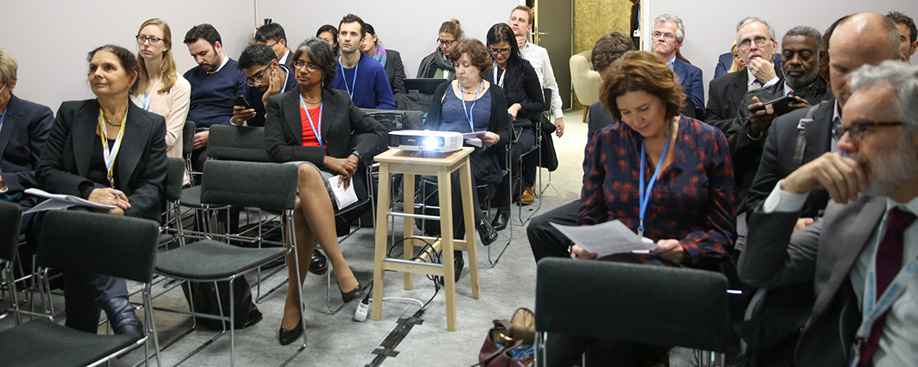
|
The Earth Negotiations Bulletin on the Side (ENBOTS) © <enb@iisd.org> is a special publication of the International Institute for Sustainable Development (IISD). This issue has been written by Lynn Finnegan, Tallash Kantai, Gillian Nelson, Ph.D., Annalisa Savaresi, Ph.D., and Asterios Tsioumanis, Ph.D. The Digital Editors are Naomi Devine and Brad Vincelette. The Editor is Dan Birchall <dan@iisd.org>. The Director of IISD Reporting Services is Langston James “Kimo” Goree VI <kimo@iisd.org>. The Sustaining Donors of the Bulletin are the European Union, the Government of Switzerland (the Swiss Federal Office for the Environment (FOEN), the Swiss Agency for Development and Cooperation (SDC)), and the Kingdom of Saudi Arabia. General Support for the Bulletin during 2015 is provided by the German Federal Ministry for the Environment, Nature Conservation, Building and Nuclear Safety (BMUB), the New Zealand Ministry of Foreign Affairs and Trade, SWAN International, the Finnish Ministry for Foreign Affairs, the Japanese Ministry of Environment (through the Institute for Global Environmental Strategies - IGES), the United Nations Environment Programme (UNEP), and the International Development Research Centre (IDRC). The opinions expressed in ENBOTS are those of the authors and do not necessarily reflect the views of IISD and funders. Excerpts from ENBOTS may be used in non-commercial publications only with appropriate academic citation. For permission to use this material in commercial publications, contact the Director of IISD Reporting Services at <kimo@iisd.org>. Electronic versions of issues of ENBOTS from the Paris Climate Change Conference - November 2015, can be found on the IISD Reporting Services website at http://enb.iisd.org/climate/cop21/enbots/. The ENBOTS Team at the Paris Climate Change Conference - November 2015, can be contacted by e-mail at <tallash@iisd.org>. |
||
|
IISD Reporting Services is grateful to the many donors of the Earth Negotiations Bulletin (ENB) and recognizes the following as core contributors to the ENB: the European Union, the Finnish Ministry for Foreign Affairs, the German Federal Ministry for the Environment, Nature Conservation, Building and Nuclear Safety (BMUB), the International Development Research Centre (IDRC), the Japanese Ministry of Environment (through the Institute for Global Environmental Strategies - IGES), the New Zealand Ministry of Foreign Affairs and Trade, the Kingdom of Saudi Arabia, SWAN International, Government of Switzerland (the Swiss Federal Office for the Environment (FOEN), the Swiss Agency for Development Cooperation (SDC), and the United Nations Environment Programme (UNEP). Funding for translation of the Bulletin into French is provided by the Government of France, the Wallonia, Québec, and the International Organization of La Francophonie/Institute for Sustainable Development of La Francophonie (IOF/IFDD). |
||